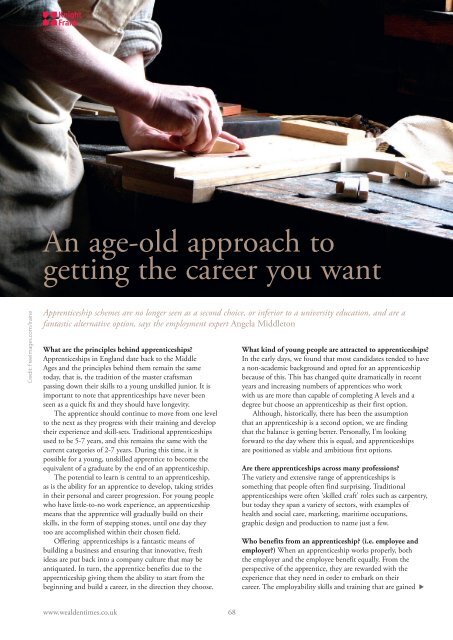Education | ED03 | Summer 2016
A Wealden Times Magazine
A Wealden Times Magazine
Create successful ePaper yourself
Turn your PDF publications into a flip-book with our unique Google optimized e-Paper software.
Sponsored by<br />
Tunbridge Wells<br />
An age-old approach to<br />
getting the career you want<br />
Credit: FreeImages.com/Iraine<br />
Apprenticeship schemes are no longer seen as a second choice, or inferior to a university education, and are a<br />
fantastic alternative option, says the employment expert Angela Middleton<br />
What are the principles behind apprenticeships?<br />
Apprenticeships in England date back to the Middle<br />
Ages and the principles behind them remain the same<br />
today, that is, the tradition of the master craftsman<br />
passing down their skills to a young unskilled junior. It is<br />
important to note that apprenticeships have never been<br />
seen as a quick fix and they should have longevity.<br />
The apprentice should continue to move from one level<br />
to the next as they progress with their training and develop<br />
their experience and skill-sets. Traditional apprenticeships<br />
used to be 5-7 years, and this remains the same with the<br />
current categories of 2-7 years. During this time, it is<br />
possible for a young, unskilled apprentice to become the<br />
equivalent of a graduate by the end of an apprenticeship.<br />
The potential to learn is central to an apprenticeship,<br />
as is the ability for an apprentice to develop, taking strides<br />
in their personal and career progression. For young people<br />
who have little-to-no work experience, an apprenticeship<br />
means that the apprentice will gradually build on their<br />
skills, in the form of stepping stones, until one day they<br />
too are accomplished within their chosen field.<br />
Offering apprenticeships is a fantastic means of<br />
building a business and ensuring that innovative, fresh<br />
ideas are put back into a company culture that may be<br />
antiquated. In turn, the apprentice benefits due to the<br />
apprenticeship giving them the ability to start from the<br />
beginning and build a career, in the direction they choose.<br />
What kind of young people are attracted to apprenticeships?<br />
In the early days, we found that most candidates tended to have<br />
a non-academic background and opted for an apprenticeship<br />
because of this. This has changed quite dramatically in recent<br />
years and increasing numbers of apprentices who work<br />
with us are more than capable of completing A levels and a<br />
degree but choose an apprenticeship as their first option.<br />
Although, historically, there has been the assumption<br />
that an apprenticeship is a second option, we are finding<br />
that the balance is getting better. Personally, I’m looking<br />
forward to the day where this is equal, and apprenticeships<br />
are positioned as viable and ambitious first options.<br />
Are there apprenticeships across many professions?<br />
The variety and extensive range of apprenticeships is<br />
something that people often find surprising. Traditional<br />
apprenticeships were often ‘skilled craft’ roles such as carpentry,<br />
but today they span a variety of sectors, with examples of<br />
health and social care, marketing, maritime occupations,<br />
graphic design and production to name just a few.<br />
Who benefits from an apprenticeship? (i.e. employee and<br />
employer?) When an apprenticeship works properly, both<br />
the employer and the employee benefit equally. From the<br />
perspective of the apprentice, they are rewarded with the<br />
experience that they need in order to embark on their<br />
career. The employability skills and training that are gained<br />
<br />
www.wealdentimes.co.uk<br />
68


















